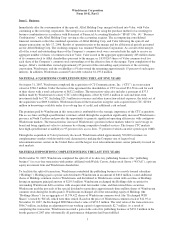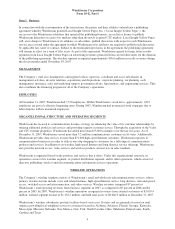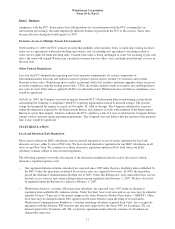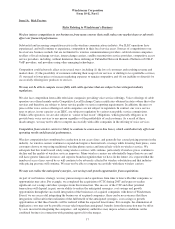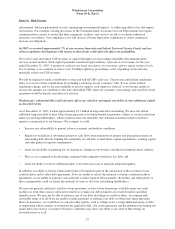Windstream 2007 Annual Report Download - page 55
Download and view the complete annual report
Please find page 55 of the 2007 Windstream annual report below. You can navigate through the pages in the report by either clicking on the pages listed below, or by using the keyword search tool below to find specific information within the annual report.
Windstream Corporation
Form 10-K, Part I
Item 1. Business
On November 20, 2007, the Joint Board issued a subsequent recommended decision for consideration by the FCC. In
this decision, the Joint Board recommended establishing a provider of last resort fund, a mobility fund and a broadband
fund. Each fund would have separate distribution and allocation mechanisms. The Joint Board also recommended an
overall cap in the size of the fund. Under the Joint Board’s recommendation, the broadband and mobility funds would
be allocated on a state-by-state basis and the states would be responsible for distributing support. The Company cannot
estimate at this time what impact the Joint Board’s recommended changes would have on the Company’s participation
in the universal service programs.
The FCC is also considering proposals regarding the contribution methodology to the USF, which could change the
types of service providers required to contribute to the fund (i.e. local exchange providers, wireless providers, long-
distance providers, VoIP providers, etc.) and the basis on which they contribute. In most cases, service providers
recover the amount of their required contributions to the federal universal service fund from their customers. Without
more specificity regarding the likely outcome of the proceeding, we cannot estimate the impact a change in carrier
contribution obligations would have on our operations.
The FCC mandated that, effective October 1, 2004, the Universal Service Administrative Company (“USAC”) would
begin accounting for the USF program in accordance with generally accepted accounting principles for federal
agencies, rather than the accounting rules that USAC formerly used. This accounting method change subjected USAC
to the Anti-Deficiency Act (“ADA”), the effect of which could have caused delays in payments to USF program
recipients and significantly increased the amount of USF regulatory fees charged to consumers. In April 2005, the FCC
tentatively concluded that the high-cost and low-income universal service programs of the universal service fund were
compliant with ADA requirements, and asked the Office of Management and Budget (“OMB”) to make a final
determination on this issue, which has not yet occurred. In December 2007, Congress passed legislation to exempt the
USF from ADA requirements until December 31, 2008. Proposed federal legislation would make this exemption
permanent.
VoIP Telephony
A number of carriers have begun offering voice telecommunications services utilizing VoIP telephony. VoIP is
challenging existing regulatory definitions and raises questions concerning how Internet Protocol (“IP”) enabled
services should be regulated, if at all. On March 10, 2004, the FCC released a notice of proposed rulemaking seeking
comment on the appropriate regulatory treatment of IP-enabled communications services. Even though the FCC has
not yet determined the regulatory treatment for IP-enabled services, it has required VoIP providers that terminate or
receive calls from the public switched network to contribute into the federal universal service fund and to comply with
the Communications Assistance for Law Enforcement Act, Customer Proprietary Network Information and E-911
requirements.
Several state commissions have attempted to assert jurisdiction over VoIP services, but federal courts in New York and
Minnesota have ruled that the FCC preempts the states with respect to jurisdiction. On March 21, 2007, the U.S. Court
of Appeals for the Eighth Circuit affirmed the FCC’s order asserting jurisdiction over certain VoIP services.
With regard to inter-carrier compensation, the extent of federal regulation and payment obligations for VoIP telephone
services may depend in large part on whether a particular service is considered a “telecommunications service” or
“information service”. Feature Group IP and Embarq, a VoIP and ILEC provider, respectively, have filed petitions with
the FCC asking the FCC to clarify inter-carrier compensation requirements for VoIP traffic. The FCC has requested
comments from the industry on these petitions. As a result of this uncertainty, a number of carriers are asserting that
the traffic they deliver to our network is VoIP originated and thus not subject to the FCC’s inter-carrier compensation
rules. Some of these carriers are not paying inter-carrier compensation to us for terminating their traffic at the
appropriate rates, and others are not paying any amount to us to terminate their traffic. To date, the total amount of
billing disputes related to VoIP traffic is not material, but it is growing. If the FCC ultimately determines that VoIP
services are generally not subject to regulation, we would be competitively disadvantaged compared to VoIP service
providers. The Company cannot estimate the effect these changes would have on wireline revenues.
9






